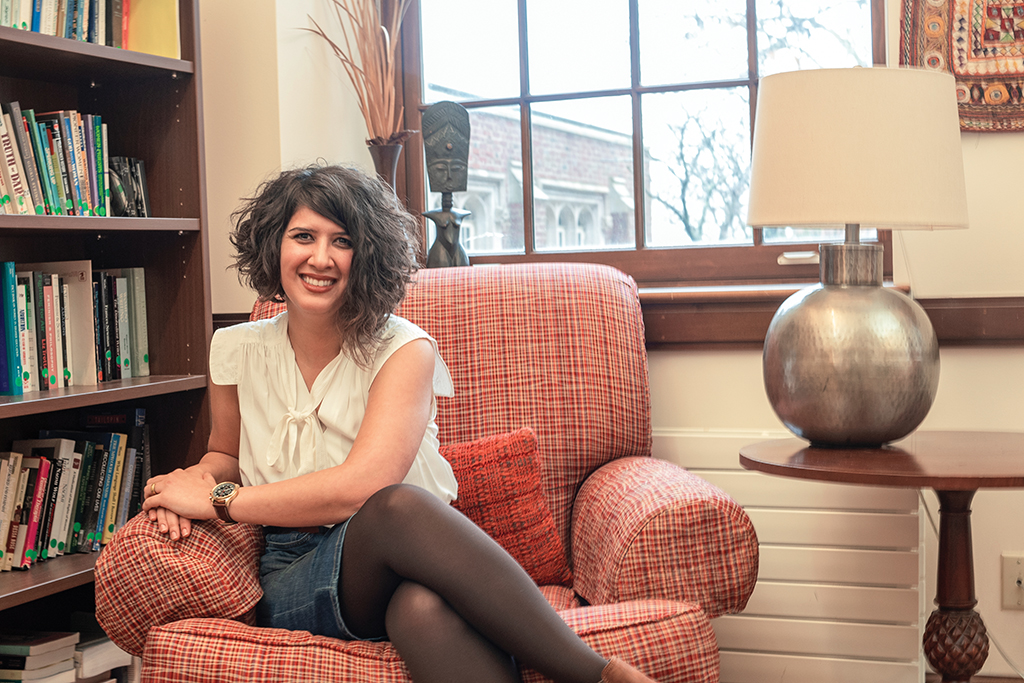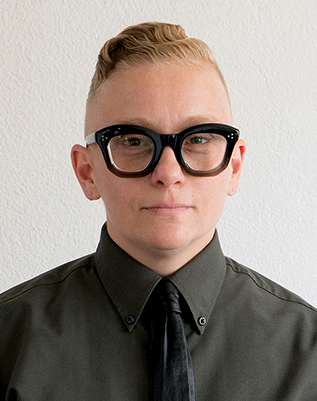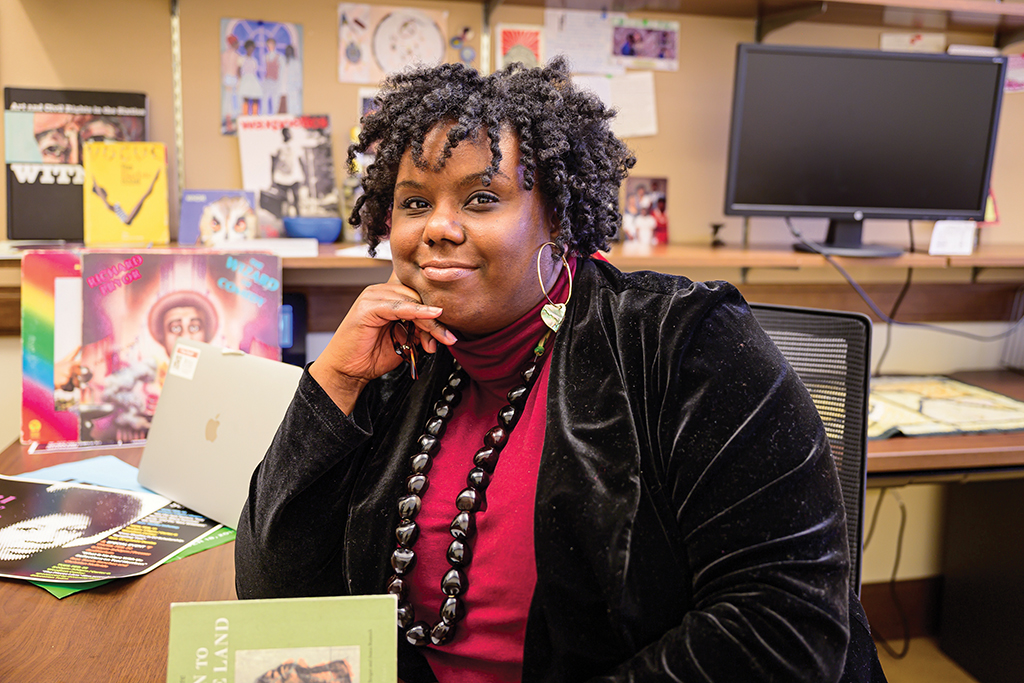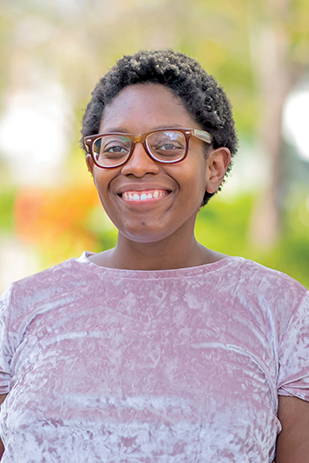Living and learning in a community of intersecting identities
Sophomore Sabina Sabal was not planning to take a Women’s and Gender Studies (WGS) class. But when she saw Intersectionality and Its Dis/Contents cross-listed with African and African American Studies, her major, she signed up. It turned out to be a uniquely broadening experience for her, opening a window into her own experience and completely changing her view of Women’s and Gender Studies.
“The idea of intersectionality and looking at sexual orientation, gender identity and race together really resonates with me,” she said of the class. “It helped me understand my upbringing, put a name to what I have experienced and the way I interact and act in the world.”
Sabal has a passion for understanding how external factors affect the mental health of communities, especially African American ones. She plans to work in that area after graduation and knows the insights she gained through the class add a valuable new perspective.
The North Carolina native is just one of the students benefiting from a re-envisioning of the WGS department. With three new faculty members who began in fall 2019, the department is in the midst of reworking the curriculum to reflect current and future academic concerns in the field of women’s and gender studies and to better speak to the realities of students like Sabal.
Rethinking women’s and gender studies
“The curriculum has not been revised in a long time,” said Dr. M. Shadee Malaklou, the new department chair. “Our new direction brings questions of sex, gender and sexuality—and their intersections—into conversation with new directions in the field. The new curriculum will think about sex and gender as social constructs, as a consolidation of behaviors that intersect with sexuality, race, class, ability, ethnicity, nation and region.”
Berea College has a rich history of intersectional analysis, especially in the ways the College builds on the works of scholars like bell hooks.
Dr. M. Shadee Malaklou
One key concept of the new curriculum is intersectionality, or the understanding that different experiences of identity affect and compound sex and gender constructs. “Berea College has a rich history of intersectional analysis, especially in the ways the College builds on the works of scholars like bell hooks,” Dr. Malaklou said.
Like hooks, the department’s new faculty understand the significance of race studies to the marginalization of people in society, particularly women of color and gender non-conforming people. They view the liberation of peoples of color as foundational to dismantling the structures of power enumerated by hooks. Through an interrelated study of gender, sex and sexuality with race and racism, the department will advance the Great Commitments of both race and gender and equity.
Dr. M. Shadee Malaklou

Ph.D., Culture and Theory,
University of California at Irvine
As a young Iranian-American woman in a wealthy, mostly white, suburb in southern California, Dr. M. Shadee Malaklou was very aware of her skin color, of how others treated her and of her reaction to that treatment. Informed by her own experiences, she found an academic home in Women’s and Gender Studies.
Her research considers the most egregious form of racism, anti-blackness and the ways non-black people of color reproduce anti-black racism because of the ways they identify and communicate their gender and sexuality.
Malaklou was attracted to Berea College because of the opportunity to build something through the department re-envisioning and the launching of the Women’s and Gender Non-Conforming Center. In classroom settings, she sees the importance of creating communities of care and of inspiring in students an unflinching critique of intersecting structures of power.
“I am invested in social justice and unlike any school I know, Berea College is committed to it, too, through the no-tuition promise and the communities it solicits for admissions,” she said. “It lives up to its radical potentiality.”
“The approach of the new curriculum has a clear and certain devotion to multiple approaches and perspectives,” said Dr. Jakeya Caruthers, another new faculty member who is an assistant professor and department chair of African and African American Studies. “Black Feminist Theory is considered important, not as auxiliary but as one of the core classes for all majors.”
While the course schedule is still in revision, four tracks are emerging as crucial elements: women, sexuality, race and activism. “As we mold this new curriculum, my hope is that students will see themselves more robustly in the curriculum and feel heard and valued,” said Dr. Linda Strong-Leek, provost and vice president for diversity and inclusion. “Some WGS students are interested in activism and some are more academic. We hope to prepare them with the tools they need to do whatever part of the work that interests them.”
The revision process
One of the hallmarks of Women’s and Gender Studies is intentionally working across disciplinary and departmental lines. With that tenet in mind, the first step of the revision process was the convening of an advisory committee last fall in which a group of faculty, staff, administrators and alumni discussed a core course sequence and new major and minor requirements. One participant was Dr. Jan Pearce, chair of the Computer Science department. While she does not specifically teach WGS classes, Pearce’s work is moving the needle on the recruitment of women in computer science.
In this collaborative process, the group made a special effort to consider the needs of students by including alumna Dayzaughn Graves ’19, a WGS major. “Sometimes students are not invited into the space where people make those decisions,” Graves remarked. “This group valued my perspective and took it very seriously.”
Graves felt she had a significant contribution as an African American and as a parent, ensuring the demands of the curriculum are reasonable for students.
In addition to the broadened focus of study, the advisory committee recommends a change in the name of the department to Women’s, Gender and Sexuality Studies. It reflects the new course offerings in queer and transgender theory.
Dr. Meredith Lee

Ph.D., Culture and Theory, University of California at Irvine
As a young teen, Dr. Meredith Lee discovered A Room of One’s Own, a feminist bookstore in Madison, Wisc. There they encountered a wealth of books by authors like bell hooks and Audre Lorde, and a community of support. This led to their pursuit of a Women’s and Gender Studies education and interest in the discipline.
Lee is interested in both the theoretical and social justice aspects of WGS. They are developing several new intersectional classes, including Feminist and Queer Dis/Ability Studies. Their primary field of study is transgender studies, and in fall 2019 they taught Berea’s first ever class fully dedicated to this field.
“Berea has fantastic students that are very committed to their education,” Lee said. “We have had some great conversations.”
Sarah Broomfield ’08, executive assistant to the dean of faculty and a graduate of the WGS department, also served on the advisory committee and saw its work as imperative.
“The women’s, gender and sexuality discipline is one that encourages us to cross boundaries with new knowledge, insights and compassion for those once thought of as ‘other,'” Broomfield said. “In these times of open discrimination on the basis of race, gender, class, sexual [orientation] and other classifying identities, it is important to have access to the tools to move beyond the borders and learn how to be part of a pluralistic and multicultural society.”
Next spring, the department will petition the Academic Program Council with the proposed changes. Malaklou anticipates a new curriculum will be in place by fall semester of 2021 or 2022.
Focus on Students
In parallel with the formal revision process is a student outreach plan, both to keep students updated on changes and encourage them to become WGS majors or minors. Through a monthly colloquium, the department invites alumni and community leaders for a conversation with students about the possibilities of a WGS degree beyond academia. Guests will talk about self-empowerment programs for women, how to collect and archive oral histories of LGBTQIA+ peoples and social justice entrepreneurship.
I am invested in social justice and unlike any school I know, Berea College is committed to it, too, through the no-tuition promise and the communities it solicits for admissions. It lives up to its radical potentiality.
Dr. M. Shadee Malaklou
At the core of this transition are students like Sabal, who didn’t know there was a place for them in Women’s and Gender Studies. These students are beginning to see themselves represented in the curriculum. They are seeking and finding ways to understand and make sense of the world.
“Students are having a radical reclamation of all of who they are,” Provost Strong-Leek said. “Young people are pushing us to think outside the boxes of race and gender as they embrace their complex identities. They are pushing us to be more inclusive.”
Dr. Jakeya Caruthers

Ph.D., Anthropology of Education, Stanford University
Dr. Jakeya Caruthers clearly remembers her first course on black feminism as an undergraduate. “It shook my entire world view,” she said. “It was not abstract, but informed the way that I see my world as a black woman. At its heart is a most profound commitment to justice.”
With wide-ranging academic interests, Caruthers has studied black culture expressions and taught a queer Afro-futurist class. She currently is engaged in a research project studying the link between incarceration and gender violence, applying her scholarly training to social science. Caruthers teaches Black Feminist Art History covering classic works by Carrie Mae Weems and Kara Walker alongside up-and-coming artists like Doreen Garner.
While hired to be the chair of the African and African American Studies department, Caruthers requested the secondary appointment in Women’s and Gender Studies. “The two disciplines are inseparable to me,” she said.


